最新新概念英语第一册95课
- 格式:ppt
- 大小:1.51 MB
- 文档页数:6
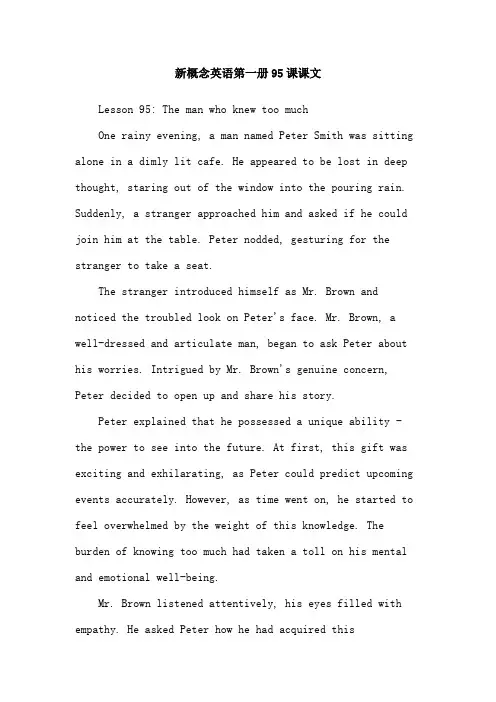
新概念英语第一册95课课文Lesson 95: The man who knew too muchOne rainy evening, a man named Peter Smith was sitting alone in a dimly lit cafe. He appeared to be lost in deep thought, staring out of the window into the pouring rain. Suddenly, a stranger approached him and asked if he could join him at the table. Peter nodded, gesturing for the stranger to take a seat.The stranger introduced himself as Mr. Brown and noticed the troubled look on Peter's face. Mr. Brown, a well-dressed and articulate man, began to ask Peter about his worries. Intrigued by Mr. Brown's genuine concern, Peter decided to open up and share his story.Peter explained that he possessed a unique ability - the power to see into the future. At first, this gift was exciting and exhilarating, as Peter could predict upcoming events accurately. However, as time went on, he started to feel overwhelmed by the weight of this knowledge. The burden of knowing too much had taken a toll on his mental and emotional well-being.Mr. Brown listened attentively, his eyes filled with empathy. He asked Peter how he had acquired thisextraordinary ability. Peter revealed that it was a result of a near-death experience he had as a child. Since then, visions of future events had appeared to him in dreams and as flashes in his waking moments.Deeply intrigued, Mr. Brown shared that he was a psychologist specializing in paranormal phenomena. He offered to help Peter find a way to cope with his gift and shared stories of other individuals who had faced similar challenges. He assured Peter that he was not alone and that there were ways to manage the overwhelming knowledge of the future.As their conversation continued, Peter felt a sense of relief and hope. He realized that he did not have to bear the burden of his gift alone. With Mr. Brown's guidance and support, Peter could learn to accept and control his ability, rather than allowing it to control him.Days turned into weeks, and Peter started to implement the coping strategies suggested by Mr. Brown. He began to meditate regularly, which helped him channel his thoughts and emotions. Through meditation, Peter learned to quiet his mind and find moments of peace amidst the chaos of his visions.Over time, Peter's mental and emotional well-being significantly improved. He was no longer consumed by the constant flood of future events. Instead, he used his gift to help others, offering guidance and support to those in need.Peter's story spread, and he became known as 'The Man Who Knew Too Much.' People from all walks of life sought his advice and comfort. Peter realized that his gift was not a curse but a unique opportunity to make a positive impact on the world.In the end, Peter Smith's journey of self-discovery taught him that even extraordinary abilities can be harnessed for good. His perseverance and the support he received from Mr. Brown helped him transform his burden into a source of strength and purpose.。
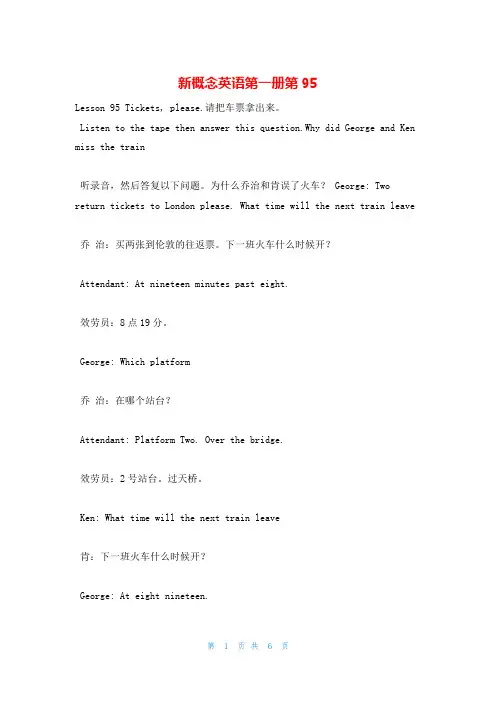
新概念英语第一册第95Lesson 95 Tickets, please.请把车票拿出来。
Listen to the tape then answer this question.Why did George and Ken miss the train听录音,然后答复以下问题。
为什么乔治和肯误了火车? George: Tworeturn tickets to London please. What time will the next train leave乔治:买两张到伦敦的往返票。
下一班火车什么时候开?Attendant: At nineteen minutes past eight.效劳员:8点19分。
George: Which platform乔治:在哪个站台?Attendant: Platform Two. Over the bridge.效劳员:2号站台。
过天桥。
Ken: What time will the next train leave肯:下一班火车什么时候开?George: At eight nineteen.乔治:8点19分。
Ken: We ve got plenty of time.肯:我们时间还很宽裕。
George: It s only three minutes to eight.乔治:现在才7点57分。
Ken: Let s go and have a drink. There s a bar next door to the station.肯:让我们去喝点东西吧,车站旁有一个酒吧。
George: We had better go back to the station now, Ken.乔治:肯,我们现在最好回车站去。
Porter: Tickets please.收票员:请把车票拿出来。
George: We want to catch the eight nineteen to London.乔治:我们要乘8点19分的车去伦敦。
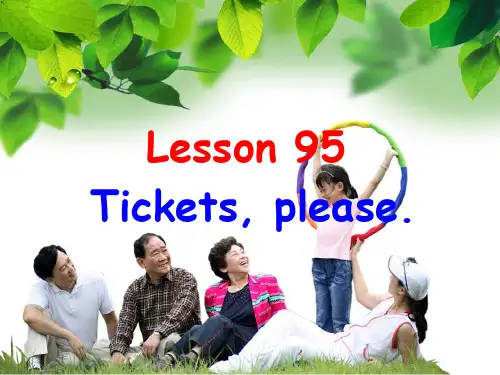
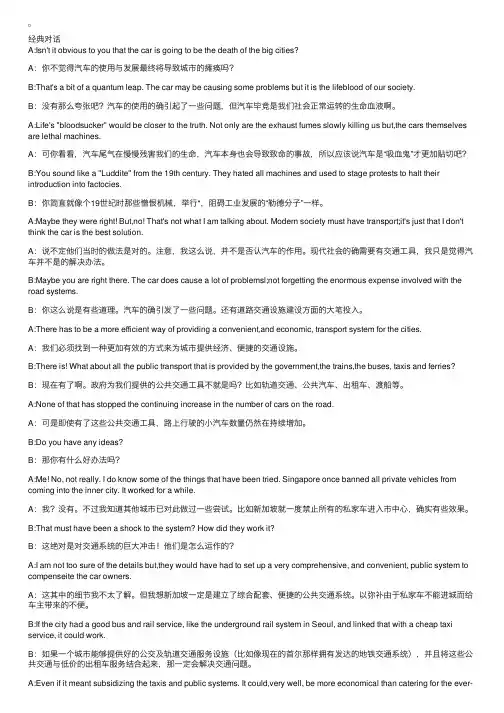
经典对话A:Isn't it obvious to you that the car is going to be the death of the big cities?A:你不觉得汽车的使⽤与发展最终将导致城市的瘫痪吗?B:That's a bit of a quantum leap. The car may be causing some problems but it is the lifeblood of our society.B:没有那么夸张吧?汽车的使⽤的确引起了⼀些问题,但汽车毕竞是我们社会正常运转的⽣命⾎液啊。
A:Life's "bloodsucker" would be closer to the truth. Not only are the exhaust fumes slowly killing us but,the cars themselves are lethal machines.A:可你看看,汽车尾⽓在慢慢残害我们的⽣命,汽车本⾝也会导致致命的事故,所以应该说汽车是“吸⾎⿁”才更加贴切吧?B:You sound like a "Luddite" from the 19th century. They hated all machines and used to stage protests to halt their introduction into factocies.B:你简直就像个19世纪时那些憎恨机械,举⾏*,阻碍⼯业发展的“勒德分⼦”⼀样。
A:Maybe they were right! But,no! That's not what I am talking about. Modern society must have transport;it's just that I don't think the car is the best solution.A:说不定他们当时的做法是对的。
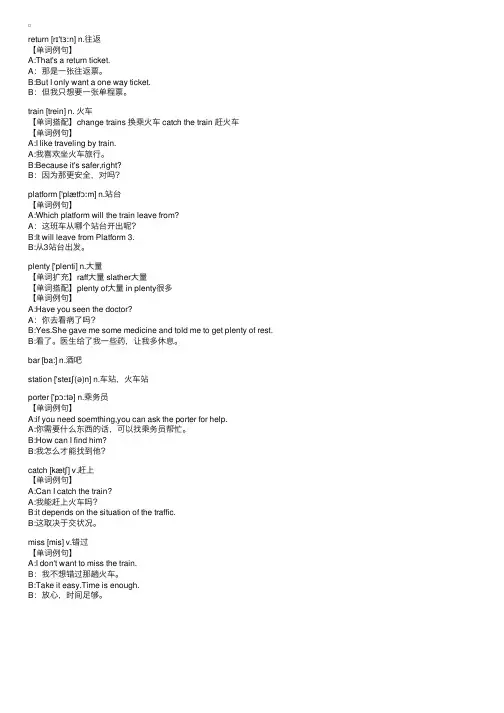
return [rɪ'tɜːn] n.往返【单词例句】A:That's a return ticket.A:那是⼀张往返票。
B:But I only want a one way ticket.B:但我只想要⼀张单程票。
train [trein] n. ⽕车【单词搭配】change trains 换乘⽕车 catch the train 赶⽕车【单词例句】A:I like traveling by train.A:我喜欢坐⽕车旅⾏。
B:Because it's safer,right?B:因为那更安全,对吗?platform ['plætfɔːm] n.站台【单词例句】A:Which platform will the train leave from?A:这班车从哪个站台开出呢?B:It will leave from Platform 3.B:从3站台出发。
plenty ['plenti] n.⼤量【单词扩充】raff⼤量 slather⼤量【单词搭配】plenty of⼤量 in plenty很多【单词例句】A:Have you seen the doctor?A:你去看病了吗?B:Yes.She gave me some medicine and told me to get plenty of rest. B:看了。
医⽣给了我⼀些药,让我多休息。
bar [ba:] n.酒吧station ['steɪʃ(ə)n] n.车站,⽕车站porter ['pɔːtə] n.乘务员【单词例句】A:if you need soemthing,you can ask the porter for help.A:你需要什么东西的话,可以找乘务员帮忙。
B:How can I find him?B:我怎么才能找到他?catch [kætʃ] v.赶上【单词例句】A:Can I catch the train?A:我能赶上⽕车吗?B:it depends on the situation of the traffic.B:这取决于交状况。
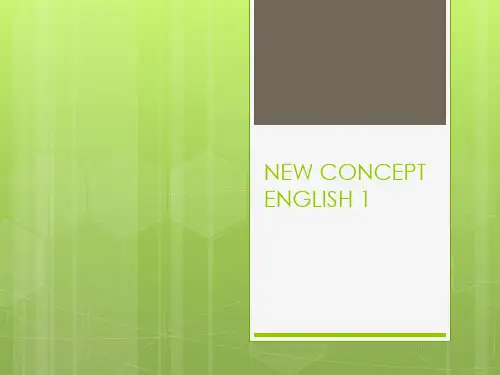
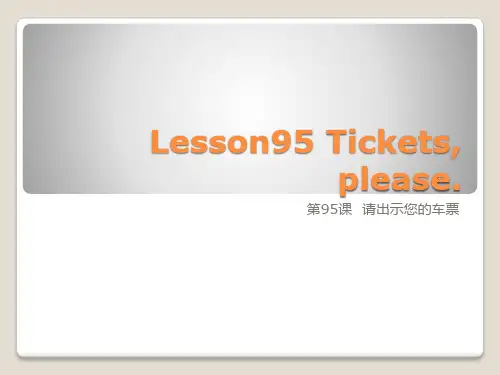
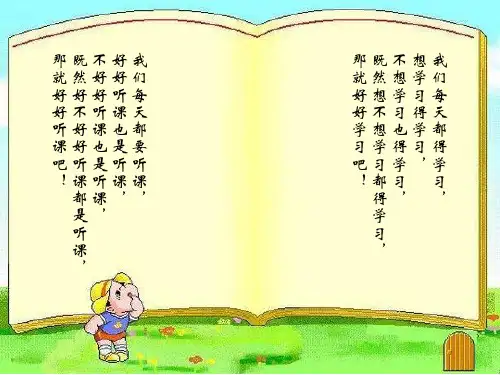
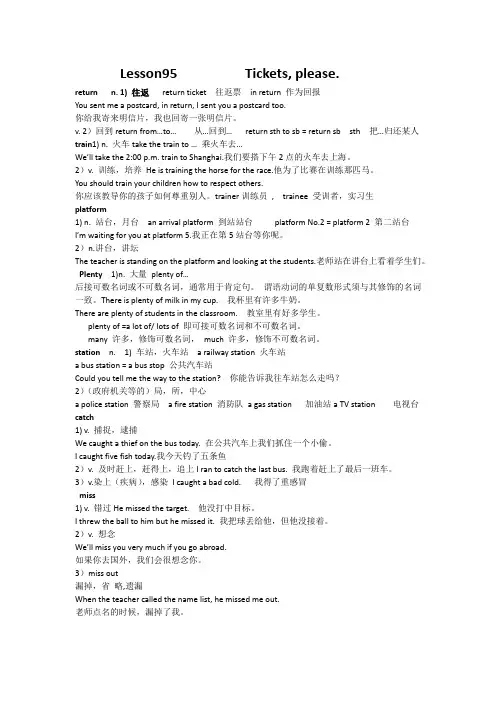
Lesson95 Tickets, please.return n. 1) 往返return ticket 往返票in return 作为回报You sent me a postcard, in return, I sent you a postcard too.你给我寄来明信片,我也回寄一张明信片。
v. 2)回到return from…to… 从…回到… return sth to sb = return sb sth 把…归还某人train1) n. 火车take the train to … 乘火车去…We’ll take the 2:00 p.m. train to Shanghai.我们要搭下午2点的火车去上海。
2)v. 训练,培养He is training the horse for the race.他为了比赛在训练那匹马。
You should train your children how to respect others.你应该教导你的孩子如何尊重别人。
trainer训练员, trainee 受训者,实习生platform1) n. 站台,月台an arrival platform 到站站台platform No.2 = platform 2 第二站台I’m waiting for you at platform 5.我正在第5站台等你呢。
2)n.讲台,讲坛The teacher is standing on the platform and looking at the students.老师站在讲台上看着学生们。
Plenty 1)n. 大量plenty of…后接可数名词或不可数名词,通常用于肯定句。
谓语动词的单复数形式须与其修饰的名词一致。
There is plenty of milk in my cup. 我杯里有许多牛奶。
There are plenty of students in the classroom. 教室里有好多学生。
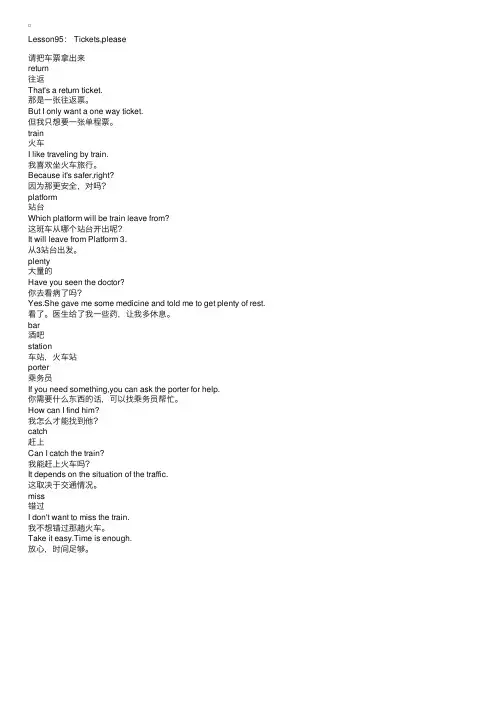
Lesson95: Tickets,please请把车票拿出来return往返That's a return ticket.那是⼀张往返票。
But I only want a one way ticket.但我只想要⼀张单程票。
train⽕车I like traveling by train.我喜欢坐⽕车旅⾏。
Because it's safer,right?因为那更安全,对吗?platform站台Which platform will be train leave from?这班车从哪个站台开出呢?It will leave from Platform 3.从3站台出发。
plenty⼤量的Have you seen the doctor?你去看病了吗?Yes.She gave me some medicine and told me to get plenty of rest.看了。
医⽣给了我⼀些药,让我多休息。
bar酒吧station车站,⽕车站porter乘务员If you need something,you can ask the porter for help.你需要什么东西的话,可以找乘务员帮忙。
How can I find him?我怎么才能找到他?catch赶上Can I catch the train?我能赶上⽕车吗?It depends on the situation of the traffic.这取决于交通情况。
miss错过I don't want to miss the train.我不想错过那趟⽕车。
Take it easy.Time is enough.放⼼,时间⾜够。
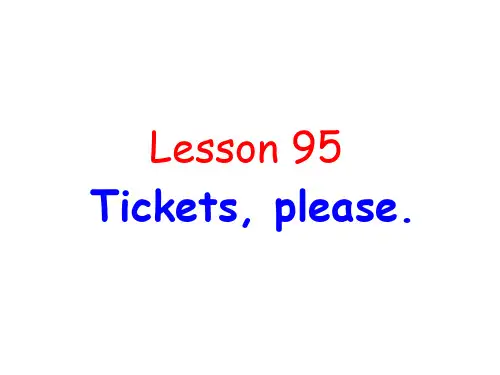
新概念英语第一册第95课课文Translation of Lesson 95。
The Green Glass.I tried and tried to get some sleep, but it was hopeless. My mind was filled with thoughts. I could not shake off the feeling that the evil eye was upon me. In the darkness, I kept seeing that green glass, just as I had seen it through the keyhole.I had no choice but to get out of bed. I tiptoed to the window and looked out cautiously. The moon was shining brightly, and I could see everything clearly. The house where I had seen the green glass was dark and silent. There was no sign of life anywhere.I decided to go and investigate. I slipped out of my room and crept downstairs. I opened the front door and stepped outside. The night was cold and still. I could hearthe sound of my own footsteps as I walked along the deserted street.I soon reached the house where I had seen the green glass. I stopped outside the gate and looked up at the windows. They were all dark except for one on theверхний этаж. A faint light was shining through it.I walked up to the window and peered inside. The room was small and bare. There was a bed in one corner, and a desk in the other. On the desk was a lamp, and next to it was a book.Sitting at the desk was a girl. She was young and pretty, with long black hair and green eyes. She was wearing a green dress, and she had a green scarf around her neck. She was leaning over the book, reading intently.I watched her for a moment, fascinated by her beauty. Then I noticed something strange. Her eyes were fixed on a small green object that was lying on the desk. It was thegreen glass!I realized that the girl must be the one who had been watching me through the keyhole. I felt a surge of anger and fear. I wanted to go into the room and confront her, but I was afraid of what she might do.I turned and ran back to my house. I went straight to my room and locked the door. I got into bed and pulled the covers over my head. I lay there trembling, trying to calm myself down.But I could not get the girl out of my mind. I kept seeing her face, and I kept seeing the green glass. I knew that I would never be able to rest until I found out who she was and what she wanted.The next day, I went back to the house where I had seen the green glass. I knocked on the door, but there was no answer. I tried the doorknob, and it was unlocked. I opened the door and stepped inside.The house was empty. There was no sign of the girl or of the green glass. I searched every room, but I could find nothing. It was as if she had vanished into thin air.I went back to my room and collapsed on the bed. I was exhausted and confused. I did not know what to think.But one thing was clear: the girl with the green glass was not going to leave me alone. She was going to keep watching me, and she was going to keep tormenting me.I had to find a way to stop her. I had to find a way to break the evil spell that she had cast over me.。